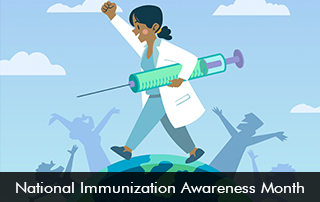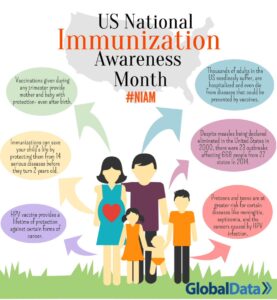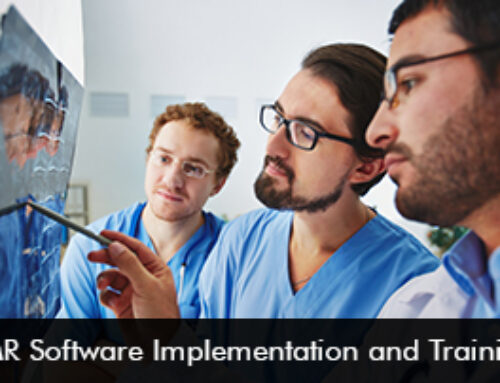Immunization awareness is essential. Despite its undeniable success, misinformation around vaccines is rife. In this blog, we will explore the importance of immunization awareness and the impact of vaccines on public health.
The Significance of Immunization
Disease Prevention
Immunization has effectively prevented the spread of numerous diseases, such as polio, measles, mumps, rubella, and more. Vaccines stimulate the body’s immune system to produce antibodies, providing protection against potentially life-threatening infections.
Herd Immunity
Immunization not only protects individuals who receive vaccines but also contributes to herd immunity. When a significant portion of a population is vaccinated, it limits the spread of infectious agents, providing indirect protection to those who cannot be vaccinated, such as newborns or individuals with certain medical conditions.
Eradication Efforts
Immunization has led to the successful eradication of diseases like smallpox, becoming the only human disease eradicated by vaccination. Ongoing efforts aim to eradicate other diseases like polio and guinea worm.
Cost-Effectiveness
Immunization is a cost-effective public health intervention. The economic benefits of preventing disease outbreaks, reducing healthcare expenses, and avoiding productivity losses contribute to long-term economic growth.
The Impact of Immunization Awareness
Combating Misinformation
Immunization awareness campaigns play a crucial role in countering misinformation and debunking myths surrounding vaccines. By providing evidence-based information, these campaigns empower individuals to make informed decisions about vaccination.
Encouraging Vaccination Rates
Awareness initiatives raise public knowledge about recommended vaccination schedules and the importance of timely immunization. By encouraging higher vaccination rates, communities can achieve herd immunity and protect vulnerable populations.
Fostering Trust in Healthcare
Transparent and educational immunization awareness programs foster trust in healthcare systems and providers. This trust is vital in promoting a positive perception of vaccination and medical interventions.
Addressing Vaccine Hesitancy
Immunization awareness efforts also address vaccine hesitancy, a growing concern in some communities. Understanding the reasons behind vaccine hesitancy helps tailor educational campaigns to dispel fears and misconceptions.
The Role of Stakeholders in Immunization Advocacy
Healthcare Providers
Healthcare professionals play a critical role in immunization advocacy. They are trusted sources of information and can engage with patients, addressing concerns and providing personalized guidance about vaccinations.
Government and Public Health Agencies
Governments and public health agencies play a central role in promoting immunization awareness. They design and implement vaccination programs, organize national immunization weeks, and fund research on new vaccines.
Non-Governmental Organizations (NGOs)
NGOs collaborate with governments and healthcare providers to conduct immunization campaigns, particularly in underserved communities or during outbreaks.
Educational Institutions
Schools and universities can contribute to immunization awareness by including vaccination information in health education curricula and promoting vaccine clinics on campuses.
The Importance of Continuing Immunization Awareness
Addressing Emerging Threats
Immunization awareness remains vital in addressing emerging infectious diseases and global health threats, such as the COVID-19 pandemic.
Ensuring Global Coverage
Immunization awareness campaigns should aim to achieve equitable vaccine access across regions and countries to protect vulnerable populations.
Promoting Research and Development
Public support and advocacy for immunization contribute to the research and development of new vaccines and technologies to combat emerging pathogens.
By combating misinformation and encouraging vaccination rates, awareness campaigns foster a healthier future for communities worldwide. As stakeholders unite in their advocacy efforts everyone has access to life-saving immunization.








